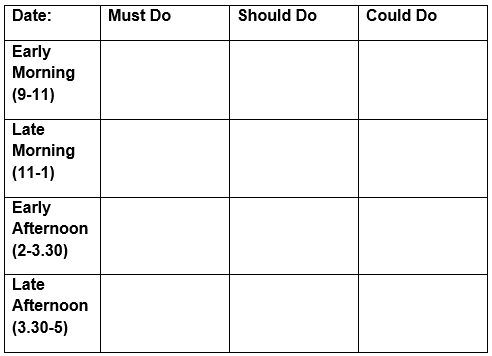
6 Time Wasters vs 6 Time Savers
The idea of time management is not a new concept but the term creates a false perception of what a person is able to do.
Time can’t be ‘managed’, time is uncontrollable and we can only manage ourselves and our use of time. Time management is actually self-management!
It is important to know what aspects of our personal management need to be improved in order for the time management process to work. Identifying your time wasters will ensure you are not wasting time on unnecessary activities. Consider some of the following time wasters:
- Mobile phone: how many times a day do you pick up your mobile to react to a message or check social media? Don’t have your phone on the desk, put it away in your drawer or bag and only check on your breaks.
- Interruptions by a phone call, messages or personal visitor: assess every interruption, if it is not urgent and important; ask if it can be discussed later. If you use an instant message system, mark yourself as Busy or Do Not Disturb in order to provide users with an indication on your current status. This may not be fool proof as some people could ignore this. Most peoples will respect these status updates if you use them accurately and not constantly marked as Do Not Disturb.
- Procrastination and indecision: decision avoidance is one of the most common time wasters. Stop procrastinating and take action. Add additional time to your plan in order to handle indecision and put time in people diary for them to discuss the decisions and provide sign off. Ensure a RAID log is maintained for any project based work and indecision can be raised as a time waster.
- Unclear objectives and priorities: This is where we waste most of our time as Business Analysts. This can result in time spent on the minor things and not on the major things that are important. When you are asked to complete a task make sure you have clear guidelines and objectives on what is expected from you and the date due in order to plan your priorities.
- Stress and fatigue: a lack of sleep and worrying about personal matters reduces productivity. Most adults need between 6-8 hours’ sleep every night. Ensure you have a good work/personal life balance.
- Desk management and personal disorganisation: how much time do you spend looking for something on your desk or computer? The most effective people work with clear desks and organised files.
Fortunately, there are strategies to better self-management in order to feel in control and reduce stress.
- Write To-Do Lists: Creating a weekly to-do list with bite size, achievable tasks that you can tick off once completed. Don’t write project titles or a task that is too high level that you can’t actually complete in the working week. Allocate a specific time limit to the task in your diary and do not go over this time. Sometimes we need to learn to stop working on something and move on, if we spend too much time deliberating over activities we can ultimately be wasting time.
- Priorities: Most of the urgent items that you work on are other people’s priorities. Ensure that you establish an expected completion date and clarify the difference between important and urgent tasks. Then you can identify priorities with simple lettering:
- Must Do
- Should Do
- Could Do
- Planning: Do not allow yourself to be distracted from your plan, work through the priorities first. Think about when you are most active/alert in the day and complete the must do tasks in this time frame. Schedule meetings to avoid wasting time with unplanned visits or quick questions. Then plan for the meeting to get the most of it. This simple daily planner can help you plan your day in order to get the most out of it. Aim to complete the Must Do and if you get to the ‘should do’ and ‘could do’ it’s a bonus.
Simple Daily Planner
- Goals: with the help of your weekly to-do list and priorities, set daily goals, so you know what you want to achieve in the morning and be specific. Learn when to say no to a task and delegate to others if you have the authority.
- Emails: We spend most of our working day dealing with emails and a majority of emails are low priority or not relevant. Think about sending fewer emails and ask not to be involved in emails that do not concern you. Prioritise incoming emails by sorting emails by Sender then To and reading emails sent directly to you first and then CC second. Remove the new email notification to avoid distraction during another task and handle emails during an allocated time slot in the day.
- Meetings: how many meetings do you attend where you leave feeling ‘that was a waste of time!’ Keep meetings brief and provide an agenda and required information prior to meeting. Place time limits on agenda items in order to avoid lengthy discussions and handle important items first. Try a stand-up meeting as they tend to take less time and decisions can be made faster. If you have been invited to a meeting, is it vital you attend? Could you delegate to someone else?
You need to recognise that you can’t do everything! Simply do more of the important things and let the trivial things fall through the cracks. Strive for significance over speed and quality over quantity. Multitasking is not possible! Not only does it decrease efficiency, it also compromises memory.
Don’t be distracted from your plan! The key to effectiveness is getting the things done that we schedule in our planners. This involves commitment and self-discipline.